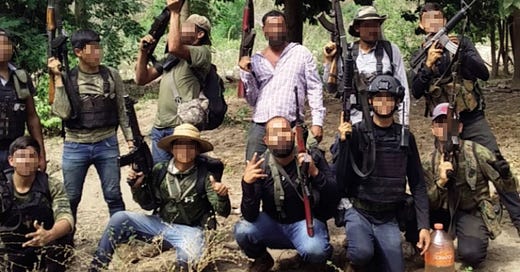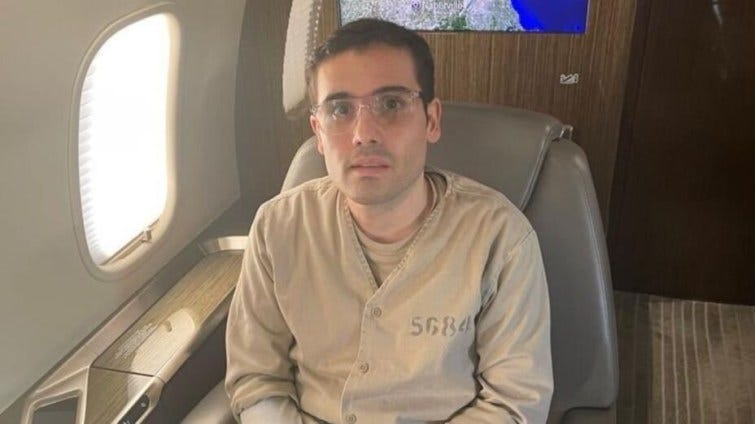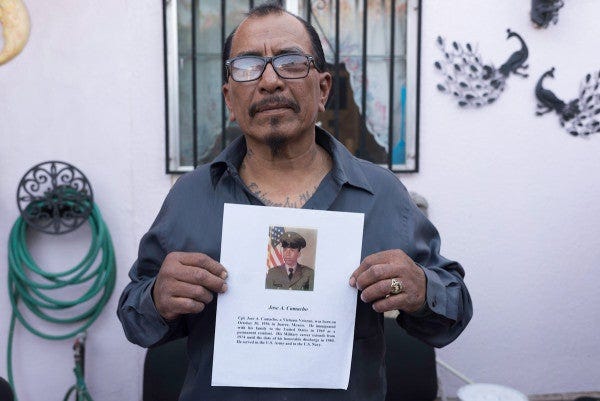Note from Lethal Minds:
Bulletin From The Borderlands is a joint project between Lethal Minds and some of the most talented OSINT analysts and independent journalists working today. Our goal is to provide you with a clear, accurate, and informative view of the world, free from censorship or bias. The Bulletin will bring you the facts, our analysis, and our evidence. We hope you find our work helps you better understand the complicated and increasingly volatile world in which we live.
Be informed, be prepared, be lethal.
The Bulletin Team:
Kitbag Conversations : A team of retired Marine and Army Intelligence analysts and the founders of the Croatoan Report and Kitbag Conversations, foreign policy and security affairs podcasts. The Team Leader for Bulletin From The Borderlands.
Analyze Educate : Brodie Kirkpatrick (Analyze & Educate) is a Marine Corps infantry veteran. He is a graduate San Jose State University with a Bachelor’s Degree in Political Science. He runs Analyze & Educate, a podcast and associated social media pages discussing geopolitics, armed conflicts, news, and history. In his capacity with Lethal Minds he is the assistant lead for the Bulletin From the Borderlands, Americas Desk chief, and an editor.
Meridian News : Meridian News is a project dedicated to sharing and aggregating open source intelligence, stories from individuals experiencing history, and amplifying underreported global news.
Sino Talk : Sino Talk is China watcher with extensive experience living and studying in China. In another life, he was a Marine intelligence analyst.
The Expeditionary Intelligence Group : The Expeditionary Intelligence Group Instagram page is a project delivering flash news utilizing open-source intelligence combined with human asset contributions and geographic intelligence to provide the general public with objective bias-free global news that tells the whole story based on the facts and on-the-ground insights they feel are missing from a lot of mainstream news reporting.
S2 Forward : A serving US Marine and Intelligence analyst, S2 Forward is focused primarily on the Mid East and Central Asia.
Calisto Report: The Calisto Report is an OSINT project dedicated to delivering timely open source analysis and conflict reporting, and chronicling global events
The Defense Bulletin: Defense Bulletin is run by John M Larrier. As a civilian, I’ve closely followed strategic developments for close to a decade, but “launched” the Bulletin during the pullout in Afghanistan due to the extreme nature of the misinformation I saw my peers as well as others reading into. The lacuna that the general populace has about these now very prevalent subjects is the stated goal for Defense Bulletin
ALCON S2: A veteran of the New Zealand military intelligence community, if it walks, talks, or crawls in Asia, ALCON S2 knows about it. Cole is the preeminent source of OSINT for the Oceania and South East Asia region.
Sponsors
The Bulletin is brought you to by PB Abbate.
As you likely know, Lethal Minds Journal shares common ancestry with Patrol Base Abbate, one of the most impactful veteran’s outreach organizations in America. One of the ways in which we connect is through a love of the written word, a belief in the power of good writing to help give a voice to people who need to be heard, and a desire to help service members and vets connect through self-expression.
In This Issue:
The Americas : Covered in this issue by Brodie Kirkpatrick (Analyze & Educate).
Mexico is in the spotlight as drug cartels continue to play a defining role in US-Mexico relations. El Chapo’s son is facing charges in a US federal court. If convicted, he will find himself in the same boat as his father. Moving back across the border, cartels are taking advantage of a unique pool of candidates for recruitment: deported US military veterans.
Europe : Covered in this issue by Meridian News and Defense Bulletin.
Turkey links a parliamentary green light on Swedish NATO membership to the U.S. F-16 deal. Ukraine’s forces reach a significant milestone in ity’s counteroffensive. Serbia has amassed forces on the Border with Kosovo, and Azerbaijan has resumed operation in Nagorno Karabakh.
East Asia and Oceania: Covered in this issue by Sino Talk
Taiwan detained 17 individuals after a fishing vessel rammed and damaged a Taiwanese Coast Guard vessel after being discovered illegally fishing in Taiwanese waters. The KMT is conducting damage control after the Taiwan Progressive Party (TTP) candidate rejected calls for the party to join the KMT campaign as the vice-presidential candidate. A Chinese company conducted the first ever test of a rotary detonation engine on a drone, allowing further development of hypersonic transport systems. China will hold the Xiangshan Security Forum in late October but is unclear who would represent the country as defense minister due to Li Shangfu disappearance over one month ago. North Korea advanced their nuclear and missile capabilities that they can use them at any time during a conflict according to a recently released Defense Strategy by the U.S. Defense Department.
The commander of Western Command is concerned that China will place another set of floating barriers at Second Thomas Shoal like it did at Scarborough Shoal on September 26th. A detachment from the Vietnam People’s Navy (VPN) is currently in Cambodia’s Preah Sihanouk province on a trip to increase and strengthen relations with the Royal Cambodian Navy (RCN). The INS Kolkata recently visited Jarkata where the vessel showed its Brahmos supersonic missile equipped Vertical Launch System (VLS) to senior Indonesian naval officers. Sri Lanka denied permission for a Chinese research vessel in Colombo in late October due to Indian and U.S. pressure over its presence in the Indian Ocean Region. Solomon Islands Prime Minister did not attend the U.S.-Pacific Islands Summit, saying he did not want to be lectured by the U.S. President.
Central Asia and the Mid East: Covered in this issue by the S2 Fwd
Iran successfully launches imaging satellites into space, while Kazakhstan vows to abide by the EU's sanctions on Russia and to import oil to Germany. Lastly, Iran, Syria, and Venezuela signed an ambitious deal to construct an oil refinery in Syria to produce 140k barrels per day.
Africa: Covered in this issue by the Expeditionary Intelligence Group
Drone strikes targeted the Wagner Group-backed Rapid Support Forces (RSF) in Sudan, with Ukrainian elements suspected to be involved. Ukrainian military sources hinted at their potential involvement. An investigation revealed Ukrainian drones and tactics in the strikes, raising questions about Ukraine's role. This potential expanded Ukrainian presence in Sudan could impact the Russo-Ukraine War, diverting Russian resources. Russia might view this as a threat, prompting adjustments in its alliances and military presence, affecting the regional balance and intensifying the Russo-Ukraine War.
The Big Points:
The Highlight: Serbia Moves on Kosovo
Serbia has amassed a concerning number of forces on the border with Kosovo. The UK has transferred command of a battalion sized element to NATO. Should Serbian forces cross the border this force alongside others will help deter Serbian aggression.
Strategic Forecast: John M. Larrier (Defense Bulletin)
Iran's successful launch of an imaging satellite and its collaborative effort with Syria and Venezuela to construct an oil refinery signal the country's expanding influence and strategic partnerships in the Middle East. This development may further Iran's position in the region. This may potentially alter the geopolitical landscape within the Middle East.
Taiwan's response to the fishing vessel incident underscores the ongoing challenges in the South China Sea. The detention of individuals involved in illegal fishing may signal Taiwan’s willingness to engage in more direct action against Chinese aggression. China's successful test of a rotary detonation engine and North Korea's advancements in nuclear and missile capabilities highlight the ongoing technological advancements and the ongoing arms race between peer nations with influence in the region. Evidence of this can be seen in the developments surrounding Indian and Vietnamese relationships with China.
Mexico's ongoing struggle with drug cartels and their impact on U.S.-Mexico relations, including the legal proceedings against El Chapo's son and the recruitment of deported U.S. military veterans, highlight the complex security challenges faced by both nations. Addressing this issue will require comprehensive strategies involving law enforcement, cross-border cooperation, and social reforms.
The involvement of Ukrainian special forces in African operations and drone strikes may cause Russia to expand its operations in Africa. Which could increase the level of great power competition on the continent.
See Also:
On the 24th of September Ukraine announced the arrival of the initial batch of 31 U.S. M1 Abrams tanks in the country.
Early today two assailants attempted to enter the Turkish interior Ministry building. One detonated a suicide bomb while the other was neutralized by security forces.
Serbian paramilitaries ambushed a Kosovar police patrol, triggering current tensions.
The Americas
Brodie Kirkpatrick
Like Father, Like Son
After his capture in January, Ovidio “El Ratón '' Guzmán López is in the United States facing federal charges. Guzmán is the third person in his family to end up in a US federal court, after his father, Joaquín "El Chapo" Guzmán, and his step-mother, Emma Coronel Aispuro.
Guzmán Family Control Over CDS
The Sinaloa Cartel (CDS) is a large organized crime syndicate that is based in the Mexican city of Culiacan, Sinaloa. The cartel is involved in many crimes, but mainly relies on the trafficking of cocaine, heroin, methamphetamine, and fentanyl, among other drugs. The US Intelligence Community believes that the cartel may be the largest drug trafficking organization in the world and may have even surpassed Pablo Escobar’s Medellin Cartel as the largest such organization of all time.
The cartel was established in 1987 by El Chapo and Héctor Luis Palma Salazar during the fall of the Guadalajara Cartel, which they were previously leading figures in. The early years of the cartel were characterized by war with other former lieutenants of the dying cartel in Guadalajara. Chapo was eventually arrested after an assassination attempt against him by the Tijuana Cartel led to the death of a Mexican Catholic cardinal instead. When he escaped from prison in 2001, Cahpo went on to assume a leading role in CDS. He was re-arrested after a 13-year manhunt by the Mexican federal government in 2014, but he famously escaped prison a second time in 2015. In 2016, he was recaptured during a highly publicized raid, Operation Black Swan, led by Mexican Marines that were assisted by US Marshals and the US Army’s Delta Force.
El Chapo’s capture and sentence of life in prison in the United States led to power struggles between the faction of Ismael “El Mayo” Zambada Garcia, another long-time high-level leader, and the faction of three of Chapo’s sons, Ovidio, Iván Archivaldo Guzmán Salazar, and Jesús Alfredo Guzmán Salazar. Their faction is known as “Los Chapitos”. The struggle between the two factions has led to deadly clashes.
Los Chapitos have been expanding their control over parts of Sinaloa, Chihuahua, Sonora, and Baja California. In addition to profiting from mining, fishing, and human trafficking, the faction has been spearheading CDS’ fentanyl trafficking operations. While loyalty to either faction differs between local bosses, CDS is essentially under the overarching control of El Mayo.
The United States v. Guzmán
Ovidio Guzmán was indicted by a federal grand jury in Washington DC on charges of conspiracy to traffic cocaine, methamphetamine, and marijuana in 2018. In 2019, there was a failed attempt by the Mexican National Guard to capture and extract him from Culican, known locally as the “Culicanazo”. In early January 2023, Mexican security forces again attempted to capture Guzmán. The pre-dawn raid in the district of Jesus Maria, Culican was successful and he was quickly flown to Mexico City.
On September 15th, Guzmán was extradited to Chicago to face charges in the Northern District of Illinois. Those charges relate to him allegedly engaging in a Continuing Criminal Enterprise (CCE), and money laundering, drug, and weapons offenses. He was arraigned on September 18th, and pleaded not guilty to his charges in front of a federal judge. He was ordered to remain in federal custody without bond. Guzmán will appear in court on November 17th for a status hearing. He faces a mandatory minimum of 10 years and a maximum of life in federal prison if found guilty1.
Not Your Average New Hires
Two issues involving US national security are becoming entangled amid reports the Mexican drug cartels are attempting to recruit hundreds of deported US veterans for their military skills. Cartels are always seeking an edge over their rivals and government officials. With the experience they bring, US military veterans are worth their weight in gold as far as cartels are concerned.
The Issue of Deported Veterans
In 1996, the Illegal Immigration Reform and Immigrant Responsibility Act was passed in the United States. According to that law, legal resident non-citizens were eligible for deportation if they have committed at least three misdemeanors. That law also applies to non-citizen veterans of the US military. The act does not allow the government to take military service into account when deciding on deportation.
Tens of thousands of non-citizen veterans have been deported using that law; possibly as many as 94,000. That includes veterans going as far back as the Korean War, most of whom were legal residents at the time. In recent years, the Department of Homeland Security and the Department of Veterans Affairs have been working together to bring back veterans who they deem were “unjustly removed” and restore their VA benefits.
The vast majority of deported veterans were born in Latin America, mostly from Mexico and Central America. A study on deported veterans from the University of California, Irvine was conducted in Tijuana, known as “deportation city”. The study found that a majority of the veterans surveyed found difficulty assimilating into Mexican society due to a lack of proficiency in the Spanish language and the general difficulty many veterans experience when trying to reintegrate into civilian life. Many of them also lacked food, medical care, and housing at some points. Lastly, most of the veterans turned to substance abuse to cope with their deportation.
Supply and Demand
El Paso ABC affiliate KVIA-TV recently reported that Mexican drug cartels have been ramping up their recruitment of deported US veterans. These veterans are sought after due to their experience and their ease of access. Oscar Hagelsieb, a former investigations supervisor with the Department of Homeland Security, told KVIA that cartels are attracted to multiple skill sets, such as weapons handling, infantry tactics, and communications. In response to the channel’s report, Hagelsieb offered a caveat, saying that it isn’t so much cartels recruiting deported veterans, as it is veterans seeking out employment with cartels.
KVIA detailed the story of one veteran, called “El Vet” by his cartel employers that was deported in 2010, some time after his service in the Marines. El Vet said in a 2021 interview that he was deported to Ciudad Juarez, at a time when violence was at peak levels. He claimed that a drug cartel reached out to him while he was walking across the Paso del Norte International Bridge. He said, “They offered me a job with a salary, clean clothes, and a house to live in. All I had to do is to go and train some kids in Sinaloa”. El Vet was murdered in Ciudad Juarez in 2021.
Miguel Perez, an Army veteran with two deployments to Afghanistan, told filmmakers of the documentary “Ready For War” that he was approached by cartel members while in a Chicago prison. He says that they told him “if you get deported, you have nothing to be worried about”. Perez said that he turned down their offer of employment.
Another Army veteran, Jose Camacho, told Task & Purpose that he was recruited by a cartel about a month after being deported to Ciudad Juarez. A man that he knew from prison persuaded him to get into a car, where he was taken to a compound in the middle of the desert. Camacho claims that it’s common for cartels to approach men living in Juarez that have done time in a US prison at one point. He claims that at this compound he was paid to teach cartel members in weapons handling and small-unit tactics. He also says that he wasn’t the only US military veteran that worked at the compound. While he didn’t say what cartel he worked for, a tattoo indicates that at some point in life he was affiliated with La Linea, a faction of the Juarez Cartel that operates in Mexico and the US. He eventually escaped the compound and found a safe house for deported veterans in Tijuana called “The Bunker”2.
Looking Forward
These stories come at a time when cartel activity is becoming an issue that is getting more focus in American society. Drugs that are trafficked into the country are killing tens-of-thousands of Americans each year. This fact, combined with cartel related violence on US soil, is causing some politicians to call for military action against the cartel. This includes at least three candidates in the Republican primary for next year’s presidential election. The popularity and effects of a military operation against Mexican cartels are being debated as a result. Mexican President Andres Manuel Lopez Obrador (AMLO) has come out strongly against this idea. However, it is difficult to argue that Mexico is capable of policing the cartel threat that has extended beyond its borders. As we get closer to November 2024 and more Americans fall victim to synthetic opioid overdoses, the calls for action against cartels will grow louder.
Keep reading with a 7-day free trial
Subscribe to Lethal Minds to keep reading this post and get 7 days of free access to the full post archives.










